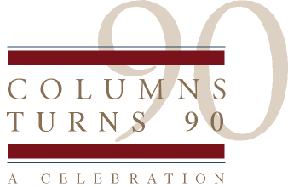

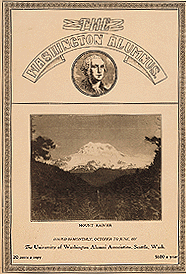
"We believe that the athlete desires to receive too much credit and attention. ... It should not be necessary to heroize a man in order to secure hard work from him. It should not be necessary to encourage him with a crowd on the bleachers. ... There is no more reason for catering to a student on account of his broad jump than on account of his broad smile. Nothing could be more truly said than that we lack a proper sense of relative values." Editorial, First Issue, June 1908
The Needs of the Women in the University
"The environments of our women must tend to culture and refinement. They need place and opportunity for the cultivation of the aesthetic. They need better facilities for music, for art., for social intercourse with the cultured women of the city. ... There should be literary, art and musical clubs, centers around with those of congenial tastes might gather." Anna Howard, Dean of Women, June 1908
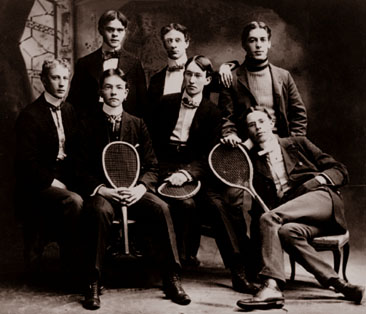
What is the Matter with Washington?
"What is the matter with Washington? Too much society. Too many social stunts. Too many young men and women wasting time and energy in "queening." Too much competition among the sororities and fraternities as to which can give the swellest and biggest social affair; and too much energy wasted in giving them." Law School Dean John T. Condon, June 1908
The AYP Puts the UW on the Map
"The primary object of the AYP Exposition is to exploit the resources of Alaska and Yukon and to make known the vast importance of the trade of the Pacific Ocean and the countries bordering upon it. ... Not only will the University's location, its beautiful campus and the grandeur of its surrounding attract universal attention, but the college, as an institution, will acquire a prominence among Eastern people, which no other method, save this of personal contact, could achieve." Minnizelle George, June 1908
Calling All Alumni Activists
"The time has come when the alumni should take an active part in the conduct of the University and they should be increasingly influential in securing appropriations for the Legislature and proper recognition from every source. ... Though these columns the alumni will be kept informed of the developments at the University, both as a matter of interest to them and in order that they may make known to prospective students and friends the conditions and opportunities existing at the present time." June 1908
Sex Segregation in Classes
"In the University there has been observed recently a slight tendency toward segregation of the sexes ... We would like to speak out against the adoption of the segregation system at the University of Washington before the tendency becomes so marked that to denounce it might sound like treason.... Suppose a woman student should elect to study law, chemical engineering, architecture, draughtsmanship, higher mathematics or political science; and no other woman in the school that year should happen to [enroll]. It would simply mean that the woman or women in question would be denied their rightful educational opportunities. Some might say that the few women discriminated against in this way would be of little consequence in the long run, and that their vagrant energies would be simply steered away from improper channels of expression into the pursuit of more womanly activities. Yes--here would be one more subtle device for keeping women's lives nicely within the well-worn grooves in which they have revolved, lo! these many years." Rose Glass, January 1909
Legacy of AYP--Buildings and 'Junk'
"The AYP Exposition will leave the University a half dozen of the finest buildings in the Northwest, but it will also leave a campus dotted with scores of boomtown shacks, filled with cosmopolitan junk, most of which will be offered to the University with variegated conditions as to adaptation." May 1909
Seattle Chinese: Pioneer Builders of the Northwest
"It has been more than half a century since the first Chinese set foot on Washington soil. In those early days the Chinese were principally engaged in unskilled labor, such as laborers in railroad section gangs, mill hands, etc. With this as a nucleus, the population increased to several hundred, and among them were men with intellectual ability and foresight. ... The Chinese population of the City of Seattle can truthfully be classified as among the pioneer builders of this great Pacific Northwest. Many large business blocks located on the principal streets are owned by some of the pioneer Chinese merchants, who were then shrewd enough to realize the future value of Seattle real estate."--Lew Geate Kay, '09, the first Chinese-American to graduate from the UW. Feb. 1910.
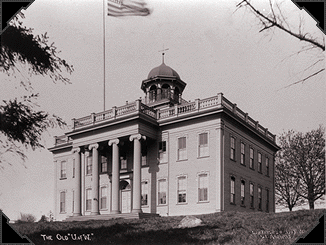
The Passing of a Landmark
"The old university building in the city is to be demolished. ... It would cost about $10,00 to take the building apart and reconstruct it of the same materials on the new campus. President Kane and some of the enthusiastic old graduates were anxious to have this done. Donald MacDonald, of the committee of alumni, sent out an appeal in all directions. The meager results in the way of financial help demonstrated the fact that in this vigorous new community the people are much more interested in the work and problems of the present day than they are in fostering a sentiment of regard for an old historic building." April 1910
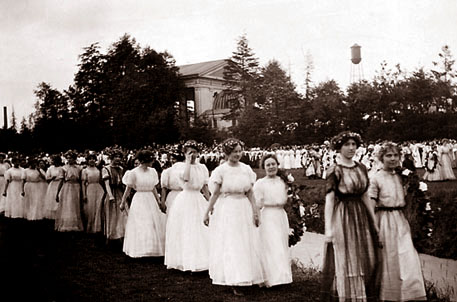 Social occasions
like this 1913 "May Fete" drew the ire of one UW alumna. Photo courtesy of UW
Libraries Special Collections
Social occasions
like this 1913 "May Fete" drew the ire of one UW alumna. Photo courtesy of UW
Libraries Special Collections
It is a Day of Many Frills
"College life at Washington is not what it was a few generations ago. ... Where formerly one man taught several subjects now one subject is taught by several men. ... The young people who were content to confine their social pleasures to the president's annual reception and a few church socials have gone, and in their place is a breeze of blasé students with a host of dinner and dance engagements. The simple order of things has passed away and it is a day of many 'frills.' " Helen M. Ross, April 1910
Rampant Commercialism Ruining Academia
"A resolution will be offered at the annual [alumni] meeting asking the association to go on record as opposed to intercollegiate contests with institutions outside of the states of Washington, Idaho and Oregon. ... The resolution is good as far as its goes. But why not strike at the root of the matter--why not resolve against the commercialism which is rampant in not only the undergraduate's athletics, but which is spreading into every line of these activities as well? Everything is measured today in gate receipts. There is scarcely a function during the college year, in which the question, "How much can we make?" does not enter. ... Few activities are carried on for pure love of doing. It is come to such a pass that the student who is willing to do something for nothing is regarded with suspicion. ... This state of affairs is a result of the athletic policy of the American university today. The football coach is paid more money for three months' work than a dean gets for the year." Editorial, May 1910
Woodrow Wilson Warns of Dependence on the Wealthy
"The colleges of this country are in ... danger. They are looking to the support of the classes, looking to the support of wealth; they are not looking to the service of the people at large. ... The universities would make men forget their common origins, forget their universal sympathies, and join a class--and no class ever can serve America. The great voice of America does not come from the seats of learning. ... I know that the colleges of this country must be reconstructed from top to bottom, and I know that America is going to demand it."--Woodrow Wilson, then president of Princeton University, June 1910.
Protecting UW Property from Land Speculators
"Two or three times within the last five years attempts have been made by individual members of the Board of Regents to get favorable consideration of the sale of the lower part of the University campus. Without discussing the past, I believe the alumni ought to be definitely on record as opposed to any plan for reducing the size of the University campus. The campus in time will all be needed for University uses and, in any event, as the city crowds upon us, we should have the full space of the campus to secure us against the encroachment of business."--President Thomas Kane, June 1910.
The Fraternities Are Here to Stay
"There is neither time nor inclination to go into the different arguments for and against the college fraternity. Suffice it to say that the various legislatures are tilting at windmills, and had better be debating on the aesthetic and utilitarian advantages of pie for breakfast. Fraternities are no longer amusements, they are institutions. ... The fraternity in some form or other will prevail as long as men and women in every activity of life seek out congenial associates." October 1910
Sex Segregation Revisited
"Girls do not like to go into classes in which they are outnumbered four or five to one by the men and the same feeling prevails among the men. ... In the department of English Literature, the classes have been segregated this year with gratifying results. ... These was at first some feeling among the women that in this segregation they were being discriminated against and an apprehension that the men would be taught by professors and that the girls' classes would be conducted by instructors, but such is not the case. The sentiment of both men and women now seems heartily favorable to the plan. ... This method of segregation is being widely considered by nearly all the universities and colleges throughout the country." October, 1910
Winning the Vote for Women in Washington
"The privilege of the ballot has been gained for woman in this state by the organized efforts of college women. ... Miss Adella M. Parker, as president of the College Women's Equal Suffrage league, made her efforts wide felt and effectual. ... 'Women vote in Idaho, Colorado, Wyoming, Utah, Australia, New Zealand, Norway and Finland. Are the women of Washington any less able to do so?' was the argument she successfully pressed home to her listeners." November 1910
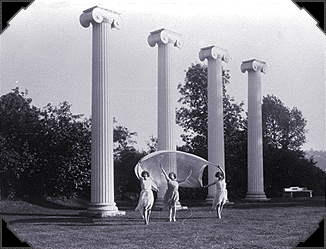
Saving the Columns from the Wrecker
Although loyal alumni and friends of the University tried by every means in their power to save it, the old building and Fourth and University, known as the Cradle of Greater Washington, has been torn down and the site utilized for new improvements. ... The alumni association saved the four pillars in front of the building and then undertook to move the entire structure to the present university grounds, but on account of the size and conditions of the streets and the Lake Union bridge, it was found to be impossible unless the building were taken to pieces, then reconstructed ... the cost at about $10,000. ... Professor Meany said in discussing the movement, "The meager results in the way of financial help demonstrated the fact that in this vigorous new community, the people are much more interested in the work and problems of the present day than they are in fostering sentiment of regard for an old historic building. In the years to come there are sure to be many regrets." November 1910
Football Coach Earns More than Full Professor
Opposition has sprung up on the part of the faculty and a few alumni to the proposed re-election of Gilmour Dobie as coach at $3,000 a year. This is a $500 increase. The opposition is not on account of the man but the salary. It is contended that for any athletic coach to receive, for less than a full year's work, a greater salary than a full professor, is to place undue prominence on athletics. The position of The Alumnus is clear and consistent. We deplore the present commercialism in student affairs. We think it much better to have the captain coach. ... But until the student body and other conference colleges reach this conclusion, there's pressing need of a professional coach at Washington. Now, since we must have a coach, it's economy to get the best available. Let's not employ a mediocre man and see matters drift back to glorious inefficiency and confusion. Gilmour Dobie makes football pay best to students, players and university. It is economy to re-employ him even at the $500 increase." December 1910
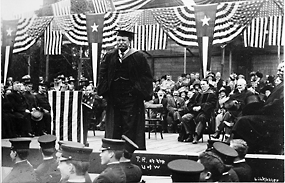
Teddy Warns of Salmon Destruction
"All of us know by rather painful experiences that river fisheries are only too easily exhausted and are finding it also true of our sea fisheries. ... And so, if you permit men to make a good deal of money for a few years by completely destroying the salmon industry in any river, it is your own fault, because if you choose you can keep it as a permanent industry, be handed on among the permanent assets of the state, to the generations that are to follow you." April 1911
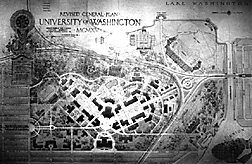
Olmstead Firm to Plan the Campus
At a meeting of the Board of Regents this week, it was voted to complete arrangements with the famous Olmstead Brothers, whereby the firm is to draft a preliminary plan for the laying out of the university campus. ... There are wonderful possibilities here and we use the word "wonderful" with full knowledge of its meaning. There is no campus in the country surpassing this one for natural setting. How important, then, that all the future steps for its beautification be taken according to some definite plan! May 1911
Old University Pillars Raised
The erecting of the columns which were brought around Alki Point in the earliest days of the University was the main feature of Campus Day, April 28. The seniors raised the columns at the foot of the walk leading from Denny Hall to the giant flag pole. May 1911.
War Between Leading Nations 'Impossible'
"The cost of preparation for war in time of peace is becoming so great that it consumes the earnings of commerce. ... Although the burden of increasing taxation and the high cost of living in the world is causing a universal unrest, the amount of money spent in armament is increased annually by the machinations of the armament trust--perhaps the greatest in the world. Thus there is talk of war in order to keep up the expenditure, when in reality war between the leading nations is impossible. For the improvements which science has made in the weapons of war and the great cost of them would prevent a nation for risking their utter destruction in a few hours' battle."--Dr. David Starr Jordan, June 1912.
Golfers Plan Links on Lower Campus
Some of the golf enthusiasts among the faculty are planning a golf course on the campus. Not being able to do the work themselves, they have arranged with the city, which maintains the lower side of the campus, to clear and grub a tract of land below the railroad track suitable for a four-hole course. It is the intention to increase the size of the course as the land is cleared. October 1912.
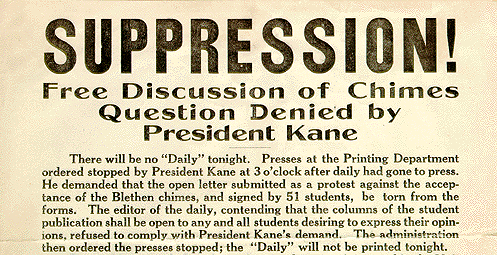
Alumni Condemn Blethen Chimes Protest
[Alden Blethen, publisher of the Seattle Times and former UW Regent, donated funds for the construction of a bell tower and purchase of campus chimes. The gift announcement came only weeks after the dismissal of a grand jury indictment against Blethen for his alleged connections to gambling and vice interests that controlled the city government. The day before the chimes dedication, the Daily planned to print a protest from 51 students, but President Thomas Kane stopped the presses and the newspaper did not appear for two days.] It is the judgment of The Alumnus both that President Kane was right in suppressing the communication of protest submitted by 51 students on the day before the new chimes were installed at Washington; and also that the students were right in objecting to the "suppression." ... The gift was announced at Christmas time, one year ago, and the time for objections had been long past. Common decency demanded that the Washington undergraduates, regardless of the matter in controversy, should play the gentleman and exercise common courtesy to a varsity guest. In suppressing the article, President Kane was fully justified. On the other hand, the students, under the self-governmental system as it now exists, were entitled to print whatever they pleased in their newspaper. ... Editor [Andrew] Eldred had the prerogative of "playing it up" on the front page or in any manner he saw fit." November 1912
C'est Magnifique-- Bernhardt Visits UW
"The University of Washington ... is what is truly perfect in Seattle. ... The amphitheater for lectures and public exhibitions is perfectly beautiful. It reminds one, because of its admirable situation, of the amphitheater of Taormina, with its hills on the one side and the sound of Messina on the other--like a natural decoration. Here, too, are numerous mountains with their eternal snows, and Lake Washington, which lies beyond the amphitheater, is magnificent. ... After breakfast [I] returned to the University to pay a visit to a young woman who was ailing and wished to see me. The girls take part in nearly all the classes, but the boys do not follow the courses in cooking. The girls alone follow it, and I regret that they are instructed only in American cooking." February 1913
Shades of McCarthy: Loyalty Oaths Considered
[The state legislature considers requiring a loyalty oath to the federal constitution.] Those who do not believe in the fundamental principles of freedom and of republican government which the constitution prescribes are those whom this nation has to fear. The time is coming when this class will be separated from the true American citizens, as were the sheep from the goats. The proposed bill will never accomplish that end. Its introduction is worthy in one respect--it has served to call attention to the fact that anarchism should not be tolerated at the University of Washington in either the faculty or student body. By this we do not include true Socialism. ... Washington has many earnest students of socialistic and economic problems in its midst, and these are as loyal supporters of American traditions as are those of other faiths. February 1913
President Thomas Kane 'Retires'
After three college generations of incumbency, President Thomas F. Kane has been forcibly retired from the headship of the university. With a suddenness which was rather more apparent than real, the regents demanded his resignation, were refused it, and dismissed him. ... For real acrobatics, we recommend the double-flip of Dr. Kane. In his fight to stay he became a progressive! Rally, ye progressives, and save him, lest ye be delivered into the hands of the reviled stand-patters! Dr. Kane in his administration was and is about as much of a progressive as President Taft, formerly of Cincinnati and Washington D.C. He was and is a man "of feebly good intentions, entirely surrounded by men who know just what they want. December 1913
President Addresses Students About the Great War
"Irresistibly there comes to us a feeling of sadness and depression because of the unhappy condition of other universities and other student bodies in other lands. Over all Europe hangs the black canopy of war--the attack of brother upon brother--the blasting of hope and the end of life itself for tens of thousands of university men. A few universities have been destroyed--others will not reopen for some time--some will open with depleted ranks--all are saddened and perturbed. The great dark cloud which hangs as a pall over the universities of Europe should give us a sense of divine thankfulness that we are free from the great human passions peculiar to the roar of war."--UW President Henry Landes, October 1914
A World Gone Mad: War Begets Insanity
"[A] social consequence of the Great War must be an increase in insanity and crime. ... Many minds are not able to stand the increasing strain of our complex civilization. Particularly is this true wherever exceptional conditions of emotional stimulation exist. The present war furnishes, as never before, just those conditions of emotional excitement and mental strain which must result in over-throwing the mental balance of many people. ... If 25 or even 50 years shall prove sufficient to overcome the set-back to civilization from the ruin of this conflict, the world may count itself fortunate, indeed."--Political Science Professor Walter Beach, November 1914
Suzzallo Salary Sizzles
Dr. Henry Suzzallo, professor of philosophy in the teachers college, Columbia University, was elected president of the University of Washington at the May meeting of the Board of Regents. He will succeed Acting President Henry Landes. ... Dr. Suzzallo will take office July 1, at a salary of $10,000, which is an advance of $4,000 over the salary of his predecessor. June 1915
What's the Matter with the Freshmen?
"Of those [freshmen] who entered the University last fall not more than 40 percent, or 50 percent at the most, will be back when college opens this month. ... The plain truth is that the freshmen are the victims of pedantry. ... The time has come, then, for those in charge of the freshmen program to 'right about face.' The present course of study has brilliantly demonstrated its futility. It ought to be revised with the sole and single aim of arousing the freshmen, of opening up life to them in as large and significant a way as possible."--Professor Frederic Padelford, August 1915
UW Goes Gothic
The new Home Economics Building will be constructed immediately from the building fund created from tuition fees. ... The type of design for the entire quadrangle will be collegiate Tudor. ... Washington is in the same latitude as France. The Gothic time of window opening was developed as a matter of necessity as light was required in the great villas and cathedrals. The Home Economics Building with its light area, accentuated perpendicular lines and gables, has Gothic features. November 1915

Gas Attacks: There is No Hope
This is the story of my personal experiences in the Western theater of war in France and Belgium. I fought under the colors of Canada, and with me always, too, were the purple and gold of Washington. ... On April 5th we crossed the Belgian frontier. In the afternoon we arrived at Ypres. ... It was on this field that I witnessed the first German gas attack. ... The enemy had in their trenches huge cylinders with this gas compressed to a very high pressure. When the wind was from them, the cocks of the cylinders were opened, allowing the gas to flow out. It rose to a height of 40 feet, and being heavier than the air, it advanced slowly with the wind, forming a large sheet or cloud. The French Algerian troops ... stood it until it came up to them, and then, taken by surprise, they were unable to withstand its effects. One breath of this is sufficient to daze a man to such an extent as to render him absolutely helpless. Those who got a very bad dose of it turned purple in the face; they coughed and gasped for breath in awful pain. Gradually amid untold sufferings, the lungs fill up with a sort of white secretion, which finally chokes the poor soldier and puts an end to his misery. All this takes three of four days, and there are no antidotes known. There is no hope; there is nothing but to let the men die amid the most awful agony a human being can behold. The gassed have separate hospitals; they are never put with others, as the sight of their sufferings is too much to behold, even for the hardiest soldier.--Aimar Auzias de Turenne, '15. December 1915
Coach Dobie Resigns--and Returns
The resignation of Gilmour Dobie as football coach at Washington and the formation of a coast intercollegiate conference were events of interest to the general public. Coach Dobie retires after bringing eight championships to Washington. In his entire coaching career he has never lost a game. His record as a coach compares with any in the country. The successful gridiron mentor does not announce definitely that he is through with the game for good. He gave out before his departure ... that if he takes up coaching again it will be east of the Rockies. December 1915 * Gilmour Dobie will coach Washington football next year. ... The story goes that Dobie came in responses to a telegram from Madison, Wis., and that he was prepared to go East to go into conference with the athletic authorities at the University of Wisconsin. However that may be, the Washington board members were able to prevail upon Coach Dobie to consider their proposition. February 1916.
[There was no Washington Alumnus published between May 1917 and March 1920.]
Send a letter to the editor at columns@u.washington.edu.